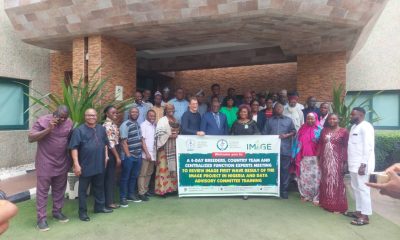Economy
Revolutionizing Nigeria’s Seed Sector: NASC Unveils Groundbreaking Portal
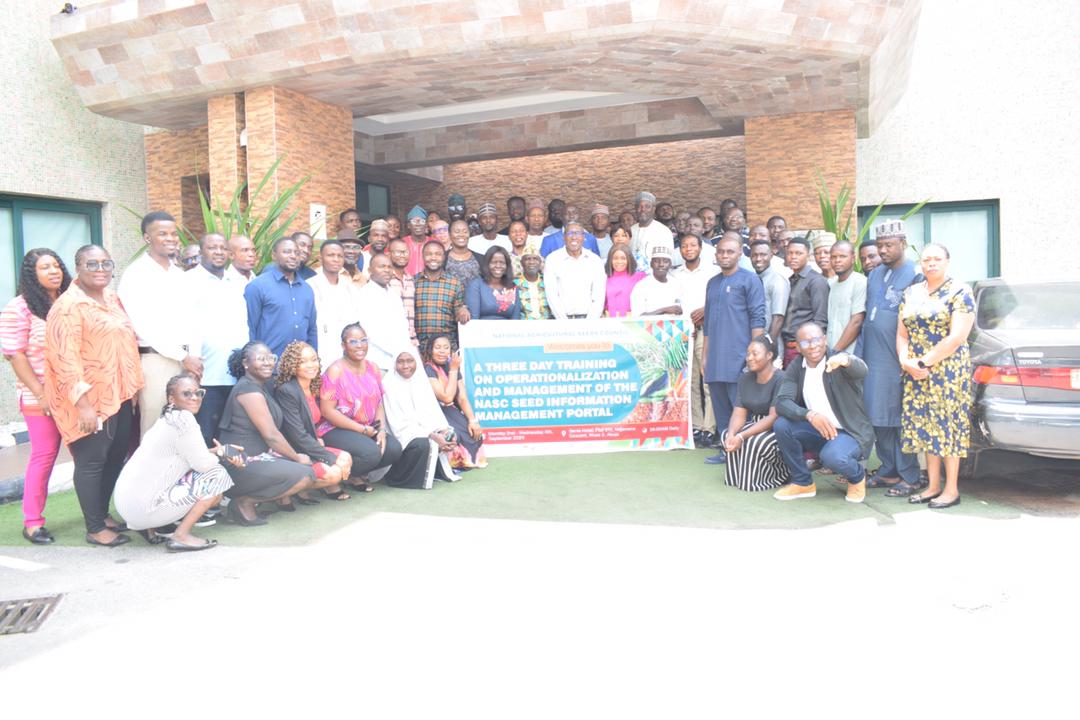
- Begins training for farmers, seed companies, others
In a bold move to transform Nigeria’s agricultural landscape, the National Agricultural Seeds Council (NASC), has disclosed plans to launch a cutting-edge Seed Information Management Portal. This innovative digital solution promises to revolutionize the seed sector, enhancing efficiency, transparency, and productivity for farmers, seed companies, and regulatory bodies.
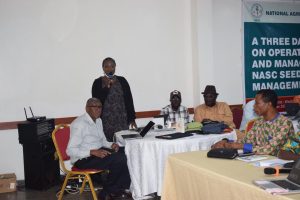
The development came to light at a recent capacity-building workshop held in Abuja, convened by the council to train key stakeholders ahead of the launch. The workshop tagged “Training on the Operationalization and Management of the NASC Seed Information Management Portal (NSIMP)”, brought together about 70 participants, comprising seed industry professionals, companies, seed council staffs, and farmers from different states and zones, to be trained on how to explore the portal’s vast potential.
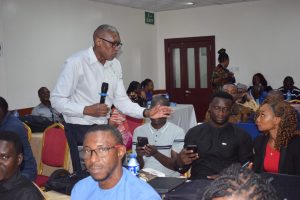
Streamlining Seed Sector Operations, Dr. Ishiak Khalid, NASC’s Director General, represented by Towolawi Oluwole, Director of Seed Information, Data Management, and Capacity Building, emphasized the portal’s critical role in managing the council’s information system. “The portal enables us to collate, and coordinate data from partners, agencies, seed companies, and farmers, providing valuable insights for more informed and harmonized decision-making,” he explained.
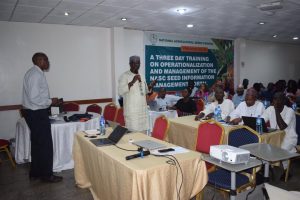
The portal’s integrated platform harmonizes disparate data sources, including seed trackers, codex, and other systems. This centralized approach facilitates real-time feedback from stakeholders, empowering the Seed Council to track industry trends, identify challenges, and respond effectively, according to Oluwole.
Also, Dr. Folarin Sunday Okelola, Ag Registrar of Plant Variety Protection (PVP) and Project Manager for the Agra grant, underscored the workshop’s significance.
He said; “Our goal is to build capacity for planning and coordinating the seed system, ensuring we meet Nigeria’s seed demand and harmonizing the whole process.”
“To effectively plan and coordinate our seed sector activities, we require accurate and timely data. This necessitates the integration of technology and electronic systems to enhance our traditional information gathering methods.
“Today, we proudly putting out our Seed Information Management Portal, a comprehensive platform that consolidates our existing tools, including the Seed Tracker and Seed Codex, into a single, user-friendly management information system.
“This innovative portal, accessible via web or Android, enables us to reach all stakeholders, regardless of category, and provides a streamlined approach to seed sector management.” He added.
The NASC Seed Portal is designed to benefit all stakeholders ranging from farmers, granting them an access to quality seeds, improved crop yields, and enhanced livelihoods, seed companies, ensuring efficient production, distribution, and sales tracking, regulatory bodies through an enhanced oversight, real-time monitoring, and informed decision-making.
By integrating comprehensive data management, analytics, and support tools, the portal aligns with the Critical Components of a Functional Seed System, as defined by CESSA. This ensures quality, accessibility, and sustainability in agricultural sector.
Please note that CESSA’s Critical Components of a Functional Seed System are quality seeds, seed availability, quality control, information management, policy & regulation, research & development, production & distribution, marketing & Sales.
Perhaps this will herald a new era for Nigeria’s Agriculture. NASC as a council, embracing digital innovation, through this groundbreaking portal will boost agricultural productivity, enhance food security, and support economic growth.
As the management training concludes Friday, participants are equipped to leverage the portal’s potential, ensuring a brighter future for Nigeria’s farmers, seed companies, and agricultural sector.
“This portal is a game-changer,” Dr. Okelola further opined. He reiterated that the council is committed to revolutionizing Nigeria’s seed sector, and the recent development is just the beginning.
Optimism high up, that with NASC’s Seed Information Management Portal, Nigeria’s agricultural landscape is set to flourish, harnessing technology to drive growth, productivity, and prosperity.
Banking
Wema Bank Celebrates 80 Years of Impact

- …Sets the stage for a future of more possibilities
Wema Bank, Nigeria’s most innovative bank and pioneer of Africa’s first fully digital bank, ALAT, has officially marked the incredible milestone of its 80th anniversary on Friday, May 2nd, 2025.
Celebrated as Nigeria’s oldest indigenous bank, Wema Bank was founded on May 2nd, 1945, as Agbonmagbe Bank Limited; an institution that has now evolved from a single-branch operation aimed at empowering indigenous Nigerians into a formidable force that continues to blaze the trail in Nigeria’s banking and financial industry.
From bridging gaps in access to finance for underserved Nigerians to empowering businesses with insightful financial solutions and support, providing a platform for other industries to thrive and proactively delivering financial solutions tailored to the needs of every Nigerian, Wema Bank has built a legacy of impact for 8 decades. With millions of customers and global presence via 150+ branches and the ALAT App, Wema Bank continues to set the pace in customer-centric innovation and impactful banking.
Extending heartfelt gratitude to the Bank’s stakeholders, Moruf Oseni, the MD/CEO of Wema Bank reiterated the Bank’s commitment to continue going above and beyond in service of its customers in the decades to come. According to him, “Wema at 80 is a milestone that extends deeply into the very roots of the industry, the people and the nation. This is an 80-year-old bank that began to set the pace for indigenous businesses in the depths of colonial rule and has remained resolute in carrying on that mission since 1945, showing the world that ‘Nigerian-owned’ can last, and institutions can be agents of transformation in their own capacity. It’s a journey I am deeply proud of and I cannot celebrate alone”.
“I take this moment to express my sincerest gratitude to every person and institution that has played a part in Wema Bank’s success story. From our customers to shareholders, investors, partners to employees past and present, and every other stakeholder whose efforts run in the veins of this great Bank. We are Wema and I take this moment, on behalf of the Board and Management of the Bank, to reiterate our lifelong commitment to you. Wema Bank is built to last, Wema Bank is built for you and Wema Bank will never relent in delivering optimum value to you. It has been 80 years of impact, and as we look ahead to a future of limitless possibilities, our promise to you remains the same. We Are With You, All The Way!”, Oseni concluded.
Wema Bank’s 80th anniversary has taken the world by storm, with a major highlight being the Wema at 80 Gala Night scheduled to hold in Lagos at 6 p.m. on Friday May 2nd, 2025. Headlined by Afrobeats stars Davido and Wande Coal, Fuji legend Ayuba, vocal sensation Yinka Davies, 9ice and a star-studded lineup of celebrities, dignitaries and stakeholders; the night promises to be one for the books, convening 8 decades of generations in a glamorous ceremony themed ‘Timeless Elegance’.
Anyone can be a part of the Wema at 80 Gala Night by tuning in live at 7 p.m. to the Bank’s YouTube Channel as well as select national TV stations.
Economy
Naira rises to N1,618/$ in parallel market

The naira appreciated slightly in the parallel market on Tuesday, trading at N1,618 per dollar, an improvement from N1,620 per dollar recorded on Monday.
However, at the Nigerian Foreign Exchange Market (NFEM), the currency depreciated to N1,604 per dollar, compared to N1,599 per dollar the previous day.
Data from the Central Bank of Nigeria (CBN) indicated a N5 drop in the naira’s value at the official window, further reflecting volatility in the forex market.
As a result, the exchange rate gap between the parallel market and the official market narrowed to N14 per dollar, down from N21 per dollar on Monday, signaling a slight convergence between both market rates.
Economy
Nigeria’s Inflation Rate Rises to 24.23% in March — NBS

Nigeria’s headline inflation rate surged to 24.23 percent in March 2025, up from 23.18 percent recorded in February, according to the National Bureau of Statistics (NBS).
The figures were released in the bureau’s latest Consumer Price Index (CPI) Report published today. The data indicates a 1.05 percentage point increase month-on-month, and a 4.40-point rise in the CPI, which now stands at 117.34.
The NBS stated, “In March 2025, the headline inflation rate rose to 24.23% relative to the February 2025 headline inflation rate of 23.18%.”
This continued rise in inflation is attributed to persistent food price hikes, supply chain challenges, and currency pressures, according to analysts monitoring economic trends.
The development is likely to influence future monetary policy decisions as economic stakeholders assess the impact on household purchasing power and overall cost of living.









